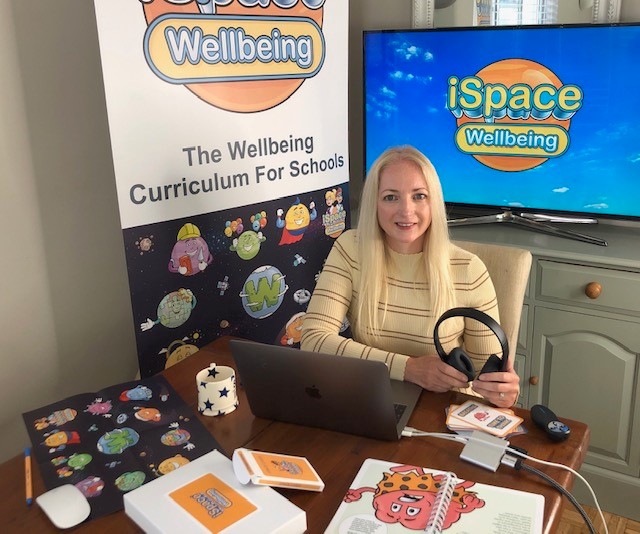

A new Wellbeing Curriculum, which has been successfully trialled in 11 schools in London and the South East, has been launched nationwide to help schools meet Government requirements for mental health, sex and relationships and give children the tools to talk about their wellbeing.

Delivered through the PHSE timetable, the iSpace Wellbeing Curriculum provides a ‘whole school approach’ to supporting children with their mental, emotional, social and physical health.
The curriculum has been devised by iSpace Wellbeing founder Paula Talman, a Director of Compliance, Health and Welfare in education, who has 25 years of experience in child development and physical and mental health. Paula has an Msc in Nursing Science, has taken part in meetings hosted by the Department for Education and is a passionate advocate and speaker on how supporting children with their mental health enables them to ‘live life well’.
The evidence-based curriculum makes learning about mental health fun, with the KS1 and KS2 curriculums introducing engaging characters and space-based missions to help children learn about themselves, their physical and emotional health and important issues like diversity in our community and the environment. The KS3 #iWonder curriculum focuses on life skills such as managing emotions, understanding risk in a digital world, problem solving and decision-making.
Teachers benefit from full curriculum materials including lesson plans, worksheets, stories and supporting slides, learning tools such as character and planet cards that children can use to communicate emotions and full training tutorials for teachers and staff. The approach gives schools everything they need to develop a common language and consistent approach to this crucial area.
With research from Barnardos showing that nine in 10 teachers believe that the Covid-19 outbreak will damage the mental health and wellbeing of pupils¹ and data from the Chartered College of Teaching showing that only five-percent of teachers feel confident to deal with this², it is hoped that this complete wellbeing solution will benefit children, teachers and parents at a crucial time.
The curriculum has been described by its pilot schools as “the gold standard”, while parents have talked of being “empowered” to support their children and pupils have described how it has helped them to “get through problems and talk about the things you need help with”.
Paula Talman, iSpace Wellbeing Founder, said: “There has never been a more important time than now to support young people with their emotional health and wellbeing and the introduction of the new Government requirements shows that this is recognised at every level.
“We have to acknowledge though that mental and emotional wellbeing is not an ‘easy subject’. It requires real time, sensitivity and understanding, from both the adults teaching it and the children learning about it, and teachers must be supported to ensure that they have the framework, the tools and the confidence to deliver what children need.
“Our Wellbeing Curriculum provides all of that by giving children a language, a toolkit and an understanding of who and how to ask for help, while also removing the pressure on teachers to have all the answers or try to find them, during what is a uniquely challenging time.
“We’re proud of our ready-to-go cost-effective solution – which works out at just a few pounds per pupil per year – and of the response we’ve received from the schools, parents and children who have engaged with it during its hugely successful pilot phase. We’re told that the curriculum is helping to change young people’s lives and so we are delighted to be able to now offer the same support to schools and pupils right across the country.”
Christian Heinrich, Member of the Board of trustees for the Cumnor Foundation and previously Headteacher at Cumnor House Sussex, which uses the wellbeing curriculum, said: “This is an area where expertise is critical and so a tried and tested curriculum like iSpace provides reassurance and security based on proven experience.”
Nicola Harmer, headteacher at Brentfield Primary School, the first state school to use the curriculum, said: “Thanks to the Wellbeing Curriculum, the whole school is now using a common language to describe their emotions. Children are able to identify tools that can help them when they feel angry or overwhelmed. Sometimes, when I plan assemblies linked to iSpace topics, I can feel the messages resonating with me – so I know with absolute certainty that it is going to be relevant to them too.”
Paul D Spencer Ellis, Chairman of the Education Committee at Great Ballard and previously a headteacher and School Inspector, said: “Without a programme like iSpace Wellbeing we would require the investment of substantial time and effort by our own teachers in preparing a coherent scheme of work covering all year groups at a time when they are already working to ensure their own subject-specific teaching is ready, and also contributing to the busy life of the school.”
Hamish Elvidge, Founder of The Partnership for Wellbeing and Mental Health in Schools added: “iSpace has created an amazing way of engaging young people in this hugely important subject, which will provide them all with such a strong foundation for their lives ahead.”
iSpace Wellbeing has also published a book, ‘Have You Ever Had a Stressor?’, which is available to schools and parents to help them continue wellbeing conversations in the classroom and at home.
To find out more about the iSpace Wellbeing Curriculum or the book, visit www.ispacewellbeing.com.